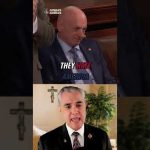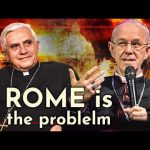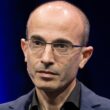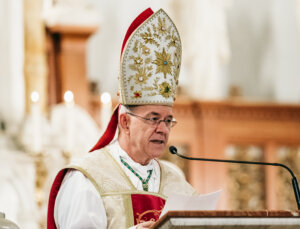Pope Francis stays on message with the release of his latest motu propio entitled Ad Theologiam Promovendam (“to promote theology”), continuing his refrain that the Church needs to reach the peripheries. Maintaining this as his primary mission is unobjectionable as Christ called all sinners, tax collectors and prostitutes, Jew and Gentile alike. On this same trajectory, however, are the consistent issues with “how” the Holy Father proposes to reach the fringes of the Church and society. Theologiam continues the fallacy that the Church is in need of more change in order to deliver Christ’s message to the world.
The Holy Father’s problematic statement quotes his favorite source of authority – himself – restating his remarks from a decade ago that we are experiencing “an epochal change.” He asserts now, “theology will have to confront the profound cultural transformations.” Pope Francis believes theology requires a “paradigm shift,” to continue the “courageous cultural revolution,” continuing his Marxist trope from Laudato Si’. Perhaps the most problematic statement of the pronouncement follows, as he commits the Church to a promoting “a fundamentally contextual theology.”
The solution he proffers is to amend the statues of the Pontifical Academy of Theology (PATH) to develop a “transdisciplinary dialogue with other scientific, philosophical, humanistic and artistic knowledge, with believers and non-believers, with men and women of different Christian denominations and different religions.” The Pope wants theologians in the mold of his ideal Church, sleeves rolled-up, in the streets with the poor and marginalized. He wants theology to meet people in their current lived experience. Okay, but to what end?
Herein lies the basic and problematic perspective of the entire papacy of Jorge Bergoglio—he believes that theology should flow from the people to the Church, and not the other way around. Theologiam continues his call for a ‘listening’ Church, consistent with the synodal way of soliciting viewpoints from every corner of the globe, from Christians and non-Christians, believers and non-believers, highly politicized so-called scientists, but definitely not TLM Catholics. We require an inductive method, he says, one which looks to observe all the world and read the signs of the times. The ‘common sense’ of the people should be consulted. This contextual theology must be “capable of reading and interpreting the Gospel in the conditions in which men and women live daily.”
The goal for Pope Francis is clear. He seeks a Catholic Church infused by the modern world, one in which everyone can see some bit of themselves and feel welcomed and accepted no matter how flawed and corrupted the theology must become. In his mind, this is the fulfillment of the amorphous spirit of Vatican II, the Church opening wide its doors. It is in that grand tradition that the Church prioritizes its open door policy and subjugates the salvation of souls. So concerned are we to losing followers to the secular world, we downplay hard truths of sin and the reality of hell in hopes that they will come back through our doors. Theologiam acts like the world just changed on us overnight and theology must finally address the cultural milieu, as if this has not been happening in the 50+ years since Vatican II. It no longer begs the question—more of the same is not the answer to what ails the Church.
The non-conciliar post-script fruits of Vatican II, like Ad Theologiam Promovendam, are the seeds of the sower that fell on rocky ground, which sprang up quickly, but when the sun came up were scorched because they had no roots. The authentic Catholic Church has roots. Vatican II did not pull them up, despite the best efforts of those who took extreme liberties to overhaul the liturgy in the aftermath. We are still the apostolic church of St. Peter. Our founder is not Martin Luther, Rick Warren, or Annibale Bugnini. We do not base our theology on the ebbs and flows of modern influence. We are the Church founded by Jesus Christ in Matthew 16:18. His Church need only to rely on His message to reach a theology for the salvation of all.
The Church and its theology does not need endless reform or fresh injections of modern world views to reach the peripheries Pope Francis so ardently desires. Our roots are the Gospel, the radical and challenging message of Christ to love and serve God and the least of His children. Our roots are the Saints, who took that Gospel and left a myriad of examples of how one can fulfill the call to Christ’s love for all of humanity. Our roots are tradition, the Magisterium which aggregates the wisdom of His Church over the millennia. Leave the inductive method to the Protestants, as they fashion churches of every shape and size to accommodate every version of worldly vice and sin, splintering the followers of Jesus into an infinite diaspora. There is no shortage of charlatans willing to read a 21st century worldview into the Gospels to create a mirage of hope for those lost in the desert.
Welcoming more people from the fringes does not equate to their salvation. Yes, Jesus dined with tax collectors and prostitutes, but He did not accept their sin. He engaged them, gave him His grace, and told them to go and sin no more. The Pope’s promotion of contextual theology synthesized with extensive reflections of modern culture seems like just another attempt to welcome all people, and their sins, pretending it’s all acceptable in the eyes of God. It is the failing of every big-tent philosophy, as more and more accommodations are made to satisfy a larger swath of people, the more the original message is diluted. In this case, the message diluted is the challenging truth of Christ’s call to repent from sin. This pontifical approach is a cruel façade of outreach and compassion, no better than leading a horse to water then denying the drink.
In all the ambiguity of the collective writings of this Pope, it is possible Theologiam is a pedantic attempt to bring the beauty and challenge of the Catholic faith to the fringes of society with the aim of evangelization and conversion. In context, this seems unlikely given the Pope’s repeated admonitions of proselytization, and the synodal emphasis on listening and increasing the laity’s decision-making role in the Church. We should always listen and not practice our faith in an echo chamber. However, I pray the Pope sees in this era of mass secularization, the answer for the Church is not to absorb and adapt to this change, but to project the fixed truth of Catholic theology as the solution to what ails the world. The theology does not need to change or flow with the modern tide. In the words of St. Bruno, Stat crux dum volvitur orbis. “While the world changes, the cross stands firm.”















